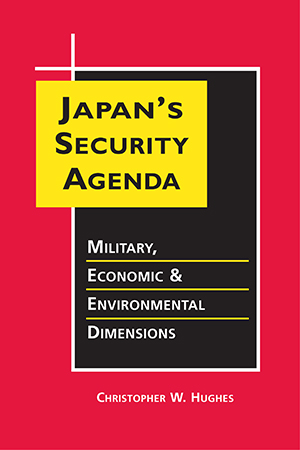Christopher W. Hughes
Long constrained as a security actor by constitutional as well as external factors, Japan now increasingly is called to play a greater role in stabilizing both the Asia-Pacific region and the entire international system. Japan's Security Agenda explores the country's diplomatic, political, military, and economic concerns and policies within this new context.
Hughes looks closely at the security issues facing Japanese policymakers: among them, remnants of Cold War conflicts, the proliferation of weapons of mass destruction, transnational terrorism, organized crime, piracy, economic dislocation, financial crises, and environmental disasters. He then examines Japan's response to these problems in the military, economic, and environmental spheres, as well as its key security relationships.
Does Japan's multidimensional and comprehensive approach to security policy offer a viable alternative paradigm to that of the traditional U.S. and European, military-dominated model? Hughes's theoretical and empirical illustrations demonstrate the benefits and drawbacks to such an approach in an era of globalization.
Christopher W. Hughes is research fellow in the Centre for the Study of Globalisation and Regionalisation at the University of Warwick. He is author of Japanese Economic Power and Security: Japan and North Korea and coauthor of Japan's International Relations: Politics, Economics and Security.
"It is marvelous to have within 240 pages such a concise overview of Japan's security policy in this broad and historical setting."—Reinhard Drifte, Journal of Japanese Studies
"Christopher W. Hughes ... has provided scholars and students with a book that will hopefully make its way to a library or classroom near you.... The book is good news for those looking for in-depth research on Japanese security and certainly a good read too."—Axel Berkofsky, International Affairs
"An excellent, comprehensive study of Japan's role in regional and global security. Highly recommended."—Choice
"Chris Hughes's unprecedented analysis of Japan's 'comprehensive security' policies provides an integrated, systematic approach to the linked military, economic, and environmental security policies of Asia's most important state.... It is extraordinarily deep and rich in the details it provides on all aspects of Japan's policies, their causes and implications. Simply, it is a tour de force."—Ellis S. Krauss, University of California, San Diego
"An intellectually stimulating and very well researched piece of work..... This is a thorough and accessible contribution to the literature on Japan's foreign and security policy."—Jürgen Haacke, London School of Political Science and Economics








